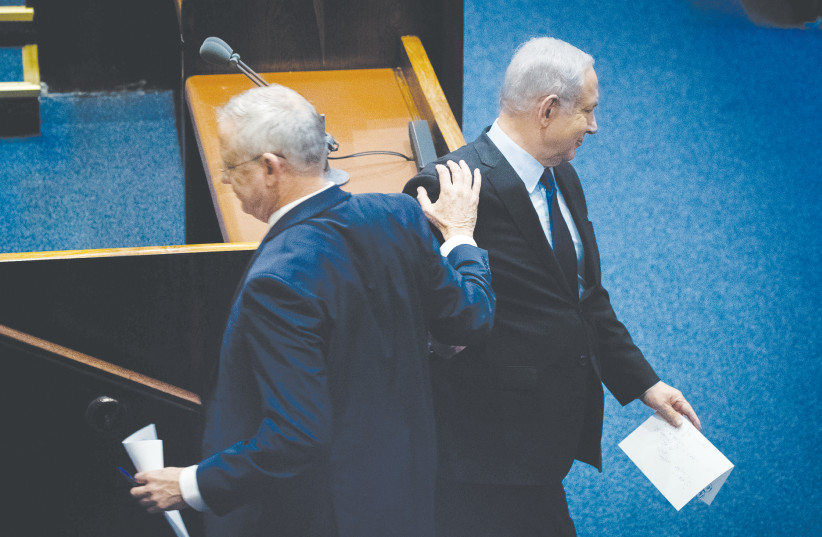Israel’s leaders must pursue a unity government – editorial
Could a trend be developing?
In recent days, there has been a perceptible uptick in the number of voices in the opposition calling for the formation of a national unity government in light of the ongoing crisis surrounding the current government’s judicial reform.
On Monday, Yesh Atid MK Elazar Stern expressed support for the formation of a national unity government with Prime Minister Benjamin Netanyahu’s Likud Party in an interview with Army Radio.
“I would be delighted if Netanyahu puts forward such an offer,” Stern said. “If he does, it will be on the table and we will have a discussion. I was never against the possibility of an extremist-free unity government.”
Then, on Thursday, National Unity Party MK Matan Kahana wrote a Facebook post in which he called on his party and Yesh Atid to join the Likud in forming such a government.
 PRIME MINISTER Benjamin Netanyahu and Blue and White Party leader Benny Gantz pass each other in the Knesset last year. (credit: YONATAN SINDEL/FLASH90)
PRIME MINISTER Benjamin Netanyahu and Blue and White Party leader Benny Gantz pass each other in the Knesset last year. (credit: YONATAN SINDEL/FLASH90)“Do you really think there is a better solution to the deep crisis the country is in now?” Kahana wrote. “Such a government will be able to heal the deep internal divide between us [and] bring the peace we all long for.”
Later the same day, Channel 13 reported that three additional National Unity lawmakers were prepared to join Kahana’s initiative under certain conditions.
Predictably, both Stern and Kahana were quickly smacked down by their respective parties.
“That is not our message, that is his personal opinion,” said a Yesh Atid spokesperson in response to Stern’s comments. “Even if a discussion is held, Yesh Atid will not enter a government with Netanyahu.”
“His position is known to us, but it was not coordinated with us,” said a National Unity official on Kahana’s proposal. “It’s fine that this is his opinion, but there is only one who decides – [party leader] Benny Gantz.”
And yet, where there’s smoke, there may well be fire.
Observers have long speculated that Gantz has been waiting in the wings for an opportune moment to join the government and save Israel. In such a scenario, Netanyahu would boot the far-right Otzma Yehudit and Religious Zionist parties – or they would perhaps leave on their own, spurred by some decision or another having to do with the settlements or the Palestinians. Then Gantz would swoop in, assuming the premiership either immediately or at some set time in the future and creating a far more moderate coalition than the current one, enabling the government to put the controversial judicial reform on the back burner and focus on other national priorities.
Gantz has repeatedly denied that he has any such plans and has rejected any suggestion of a power-sharing arrangement with Netanyahu.
We can hardly blame him, burned as he was by his previous adventure with Netanyahu, in which he was denied the premiership despite having been guaranteed it as part of a rotation agreement.
And yet, we have to wonder whether now is the time to explore some form of a national unity government nonetheless.
Several configurations may be possible. An arrangement uniting Likud, Yesh Atid, and National Unity – the largest parties in the Knesset – would bring the coalition to a healthy 68 seats. A more plausible scenario such as that outlined above, in which National Unity would simply replace Otzma Yehudit and Religious Zionism, would bring the coalition to a slimmer 63 seats – still a majority.
A unity government would face instability
The pitfalls are clear. As this paper’s Herb Keinon wrote last week, a union of the three largest parties would be “a government of paralysis headed by three men who don’t trust, like, or respect one another.”
“Once the ship is righted,” Keinon suggested, “the government would collapse – as the last Bennett-Lapid government collapsed – because differences could only be swept under the rug for so long.”
And yet, he wrote, while such a government “may be a pipe dream… currently, there are few alternatives to getting Israel out of its impasse.”
As the country heads for a showdown over the reasonableness law at the Supreme Court and as the Knesset’s winter session creeps nearer, now is the time for creative, responsible thinking on the part of our elected leaders.
If a national unity government can prevent us from being plunged into an even deeper state of crisis, it is incumbent on our leaders to explore it seriously.





Comments are closed.